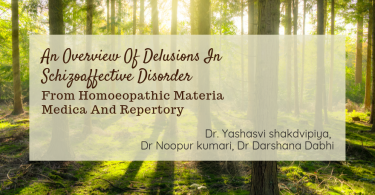
ABSTRACT: Depression is now the world’s most wide-spread illness and most common mental disorder. Globally more than 300 million people of all ages suffers from Depression and leading cause of disability worldwide, major contributor to the over-all global burden of diseases, at its worst, can lead to suicide. According to National Mental Health Survey (NMHS) By NIMHANS one in twenty people in India suffers from depression. Conventional treatment is by way of antidepressants. The adverse effects of SSRI is not hidden anymore, it is a time to reevaluate all we have learned.
INTRODUCTION: Depression is now the world’s most wide-spread illness and most common mental disorder. Globally more than 300 million people of all ages suffers from depression, according to WHO report increase of more than 18% in depression cases between 2005 and 2015.
- Depression is the leading cause of disability world wide
- Major contributor to the over-all global burden of diseases
- At its worst, can lead to suicide
ETIOLOGY: Depression is a multifactorial clinical phenomenon. It result from social, psychological and biological factors. Stressful life events are one of common precedents in the first episode of depression and may leave a person more vulnerable to develop subsequent episodes.
CLINICAL PICTURE: clinically, depression presentation vary symptomatically according to age of the patient. Clinician should observe symptoms according to age of the patient for its diagnosis and management.
CLINICAL PRESENTATION IN CHILDREN: Depressive disorder occurs in children of all ages but are much more prevalent with increasing age. Children and adolescents with depressive disorder often display irritability, withdrawal from family and peer, and detoriation in academic investment leading to devastating social isolation. In order to address the concerns about the potential for the over diagnosis of and treatment for bipolar disorder in children, a new diagnosis ,disruptive mood dysregulation disorder (DMDD) has been recently added to the depressive disorders for children up to 12 years of age in DSM 5.
CLINICAL PRESENTATION IN ADULTS: Dysphoric mood, sadness, loss of interest & pleasure. Change in psychomotor activity. Changes in appetite and weight, sleep disturbances. Decreased sexual activity/ loss of libido, sense of worthlessness. Cognitive impairment, thoughts of death or suicide. Nihilistic delusions.
CLINICAL PRESENTATION IN OLD AGE: depressive symptoms are present in about 15% of all older adult community residence and nursing home patients. Age itself is not a risk factor for the development of depression. But being widowed and having a chronic medical illness are associated with vulnerability to depressive disorders. Decreased energy and concentration, sleep problems, decreased appetite, weight loss and somatic complaints, self-accusatory trends especially sex and sinfulness with paranoid and suicidal ideation, dementia.
MANAGEMENT OF DEPRESSION:
MANAGEMENT OF DEPRESSION IN CHILDREN:
When assessing a child or young person with depression, routinely consider and record in the patient’s notes potential comorbidities and the social, educational, and family context for the patient and family members. This information should include the quality of inter personal relationships between the patient and other family members, patient and his or her friends and peers. Risk factors should be assessed for suicidal ideation or suicidal attempts.
MANAGEMENGT OF DEPRESSION IN ADULTS:
in adults management of depression is mainly based on person centred care, principals for assessments and individual and cognitive behavioural therapy. Information about any suicidal attempts is important.
MANAGEMENT OF DEPRESSION IN OLD AGE:
Management of depression in old age is mainly based on establishing and maintaining a therapeutic alliance is important, monitor the patient psychiatric status and safety, provide psycho education to patient, when appropriate, to the family members. Enhance treatment adherence, improve social support and family support. Life style modification are also necessary .particularly in old age we should address the feeling of hopelessness/depression in turn suicidal ideation.
HOMOEOPATHIC APPROACH:
In treatment of depression, conventional approach gives important to the imbalance to chemicals in brain or mainly serotonin, but complexity of this disorder is not only physical but the subjective part of an individual, his emotions and feelings is also very important, so here a homoeopath can take a better place.
Homoeopaths have a deep respect for the interconnectedness of the physical and emotional and mental bodies and take emotional injury as, if not more, seriously than physical injury.
In case of depression, physician should take into account the premorbid personality, morbid personality and the events/ any causative factors in between premorbid and morbid phase, then the presenting symptoms, in long standing cases of depression miasmatic understanding of the case is very important, by taking into account appropriate dose should be prescribe in higher potencies except where deep pathologies present in patients.
Addressing the totality of an individual suffering from depression is the most significant approach in healing or treatment of this disorder and also care should be taken to remove “maintaining causes” such as social and familial issues, no matter what form of medicine is given. Based on this a homoeopath will prescribe medicine, which will be beneficial to the overall health of an individual suffering from depression.
Bibliography
- World health organization. Depression. WHO media centre
- Synopsis of psychiatry- Benjamin james sadock et al
- New oxford textbook of psychiatry- Michael G Gelder et al
- Textbook of post graduate psychiatry- Vyas, Niraj Ahuja
- Essentials of psychiatry- MS Bhatia
- Psychiatry- Tasman Allan et al
- Introduction to psychology- Clifford Morgan
- National mental health survey of India- NIMHANS Bangalore
- Nelson Textbook of paediatrics- Kliegman et al
- Organon of medicine- Samuel Hahnemann
- Homeopathic guide to stress- Castros Mirada
- Lectures on Homoeopathic philosophy- J T Kent
Guided By:
Dr Girish Navada U K
HOD, Dept Of Homoeopathic Psychiatry,Father Muller Homoeopathic Medical College & Hospital, Mangaluru.





